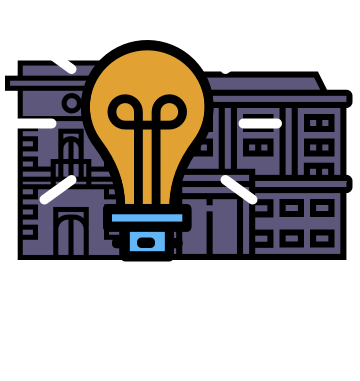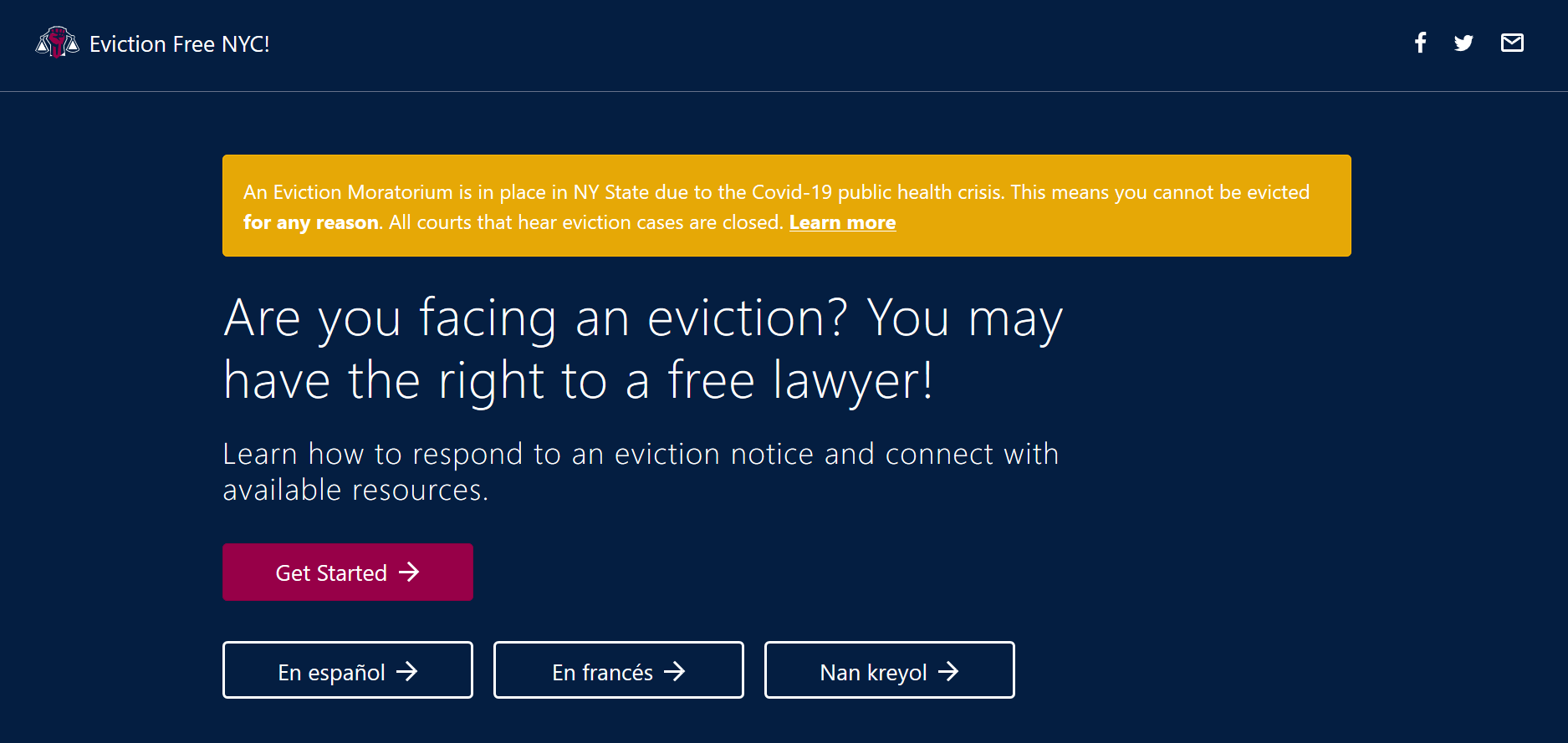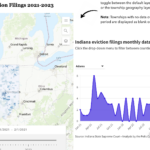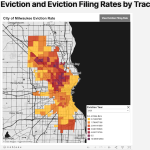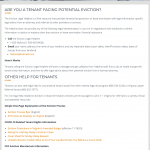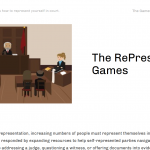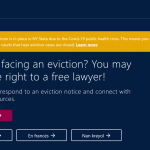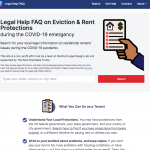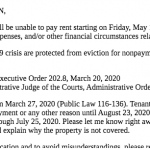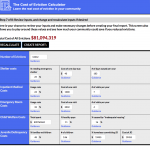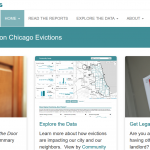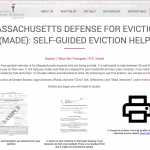What kinds of websites, apps, and other technology tools can help people dealing with an eviction?
Technology can be used to document living conditions, gather evidence, and correspond with landlords.
The Eviction Innovations Team has gathered examples of how tech can be used in eviction prevention work. Explore it below, and let us know if there are other tools to be shared!
Eviction Prevention Tech posts
- Eviction Diversion Data StrategyLessons from the Eviction Diversion Initiative for Coordinated Data & Outcomes Measurement Eviction diversion programs aim to prevent unnecessary displacement by connecting tenants and landlords with referrals, resources, and resolution options such as mediation. As these programs expand, evaluating their effectiveness is crucial for improving services, influencing policy, and ensuring they meet the needs of vulnerable communities. At a recent working group session of the Access to Justice Network/Self-Represented Litigation Network on research for access to justice, Neil Steinkamp of Stout led…
- Local Eviction Data TrackersMany more cities, counties, and states have begun to track eviction court data. The New America project on improving Eviction Data has collected together a national view on who is currently collection eviction case & outcome data, and how they’re being shared out. There are a handful of national Eviction Data Trackers: Local Eviction Data Trackers & Dashboards There are also locally-created Eviction Data Trackers: Indiana: https://storymaps.arcgis.com/collections/cb395c1ffe0a454d84c530a797aa0201?item=1 Chicago: https://eviction.lcbh.org/data Atlanta: https://metroatlhousing.org/atlanta-region-eviction-tracker/ Alexandria: https://public.tableau.com/app/profile/katherine.key2321/viz/AlexandriaVAEvictionTrends/SummaryDashboard NYC: https://www.righttocounselnyc.org/nyccrisismonitor Maryland: https://public.tableau.com/app/profile/yates.bi.consulting/viz/HousingDashboardJul10/HousingDashboard King County: https://www.kcba.org/?pg=HJP-Heat-Map Philadelphia (Pew report): https://www.pewtrusts.org/en/research-and-analysis/articles/2022/11/02/eviction-court-outcomes-in-philadelphia-differ-by-type-of-landlord…
- Indiana Evictions DashboardIndiana courts have made data about eviction filings available, and this interactive dashboard presents case filing data along with demographic, geographic, and individual story data.
- Online Dispute Resolution for landlord-tenant court in DelawareDelaware Justice of the Peace court may be the first in the nation to launch an online platform for landlords & tenants to resolve their case without going to court in person. This Landlord-Tenant ODR system is built by Matterhorn (a Court Innovations company). The ODR system allows for online mediation. In some cases it might be required by the judge. They may order the parties to participate in the ODR platform before a trial can…
- Tenant Power Toolkit for CaliforniansLA nonprofits have created a free legal technology tool for tenants to respond to their eviction lawsuits. The Tenant Power Toolkit helps a person easily fill in the answer form & get it into the court.
- How can text messages help prevent evictions?By Sarah Verschoor, originally published on Legal Design & Innovation During many evictions, tenants & service providers face a troubling paradox. Just when a tenant is most at risk of eviction — and most in need of legal, financial, and housing services — this is when it is most difficult for service-providers to engage with them. When people are behind on their rent or worried about their landlord suing them, it’s often very difficult to reach…
- Eviction Data Tracker in the Atlanta RegionA coalition of the federal reserve, Georgia Tech, and a regional commission established a detailed eviction data tracker to understand what is happening with eviction court case filings.
- Texting tenants immediately after lawsuit is filedCourts, legal aid groups, and diversion programs are using text messages to send reminders, referrals, and encouragement to tenants to participate in court and avoid eviction
- Data tracking evictions in MilwaukeeThe Track Milwaukee Evictions website has gathered data about local eviction filings, court outcomes, neighborhood risk, and housing code violations. They present the data fields & visualizations to show how the eviction system works locally — and who is most at risk.
- ERAP smart digital system in PhiladelphiaIn Philadelphia, the housing team has used federal funds to build a smarter, more flexible technical system to improve their ERAP applications.
- Eviction Legal Helpline in VirginiaThe Eviction Legal Helpline provides Virginian tenants with advice, information, and referrals. It works via phone and emails.
- RePresent tenant education games in Connecticut & MaineRePresent: Renter is a mobile phone game that users can download and play in order to learn how to defend themselves against an eviction. It is currently available in Connecticut and Maine.
- Website connecting tenants with free attorneys in NYCThe Eviction Free NYC website helps connect people with free legal help. Any tenant in NYC who is facing eviction can go to the website to determine if they are eligible for Right to Counsel and learn how they can access a free attorney.
- COVID-19 Eviction FormsHow can a person get protected under the national eviction moratorium during COVID-19? They need to fill in a Declaration document, as well as making sure they fit the requirements the CDC has laid out. This online tool, COVID-19 Eviction Forms, leads people through this Declaration drafting.
- Eviction Legal Help FAQ site for COVID-19 renters’ rightsThe national eviction help and renters’ rights FAQ site coordinates plain-language explanations of emergency COVID-19 protections for renters. It also presents them with local legal and financial assistance they can use. Can I be evicted? What if I can’t pay my rent because of COVID? Who can help me cover my housing costs? This FAQ site is designed to get these local answers featured more prominently on search engines and elsewhere online.
- Letter Writer with Local Law for Tenants during COVID-19A national letter-writing tool for tenants, that integrates local law — during the COVID-19 pandemic. Tenants can use the tool to write a letter that protects their rights and documents their issues — and also send the letter to the landlord.
- Letter-writer for COVID-19 emergency in LAA letter-writing tool to generate an official notice that a tenant can’t pay rent due to the COVID-19 pandemic, to ensure the landlord is given proper notice.
- Eviction Cost CalculatorThe I4J Lab at University of Arizona has created a Cost of Eviction Calculator. This tool can help policy-makers, service-providers, and others to determine what the financial cost of an eviction is to their community.
- Eviction Data Portal in ChicagoThe Chicago Evictions data portal is a resource to help policy makers, community groups and others investigate Chicago’s chronic eviction problem.
- Eviction Prevention Letter-Writer, Hello LandlordHello Landlord is a program developed by LawX and SixFifty to resolve rental issues before eviction takes place. The program helps tenants write a letter to their landlord if they have missed rent or need a repairs to their apartment.
- Online Legal Self-Help in BostonMADE is an online tool to let tenants produce eviction pleadings if they are facing a lawsuit. It helps replace a 4 hour clinic that a legal aid group runs to help tenants respond to evictions.
